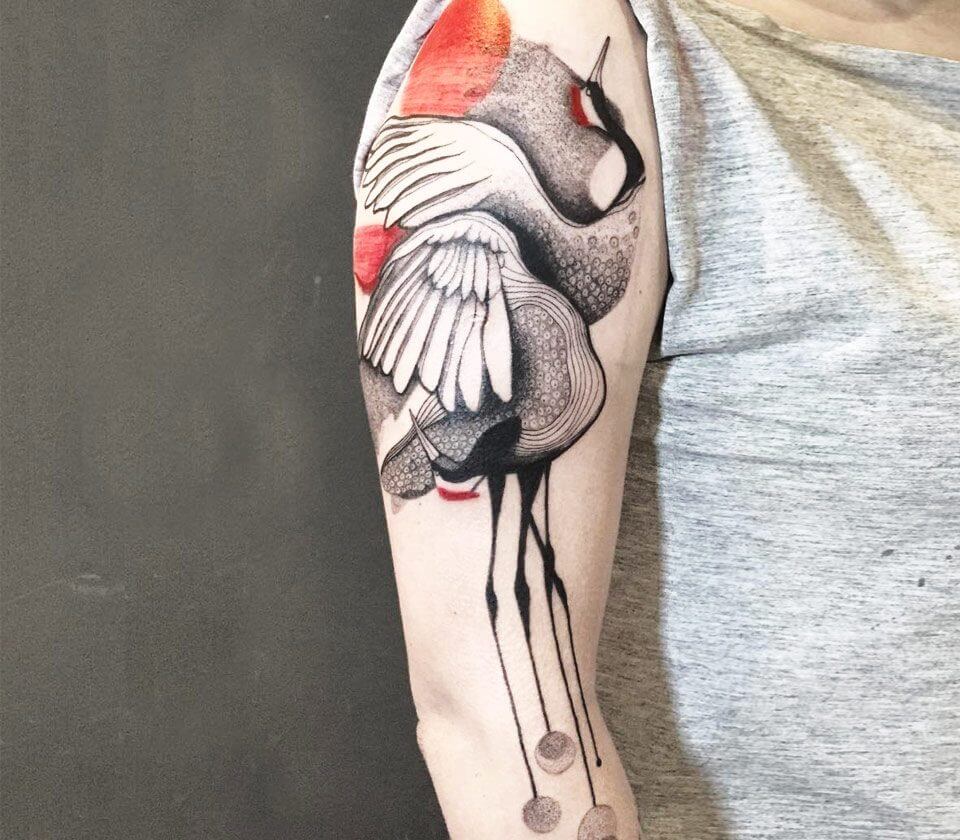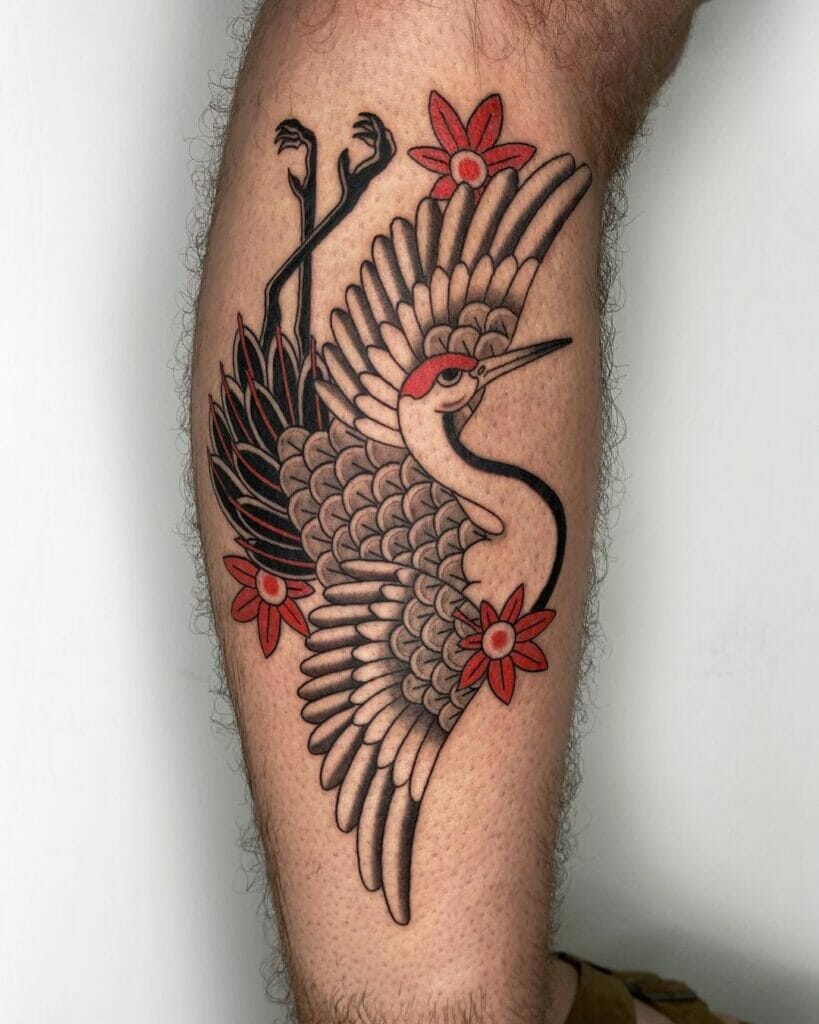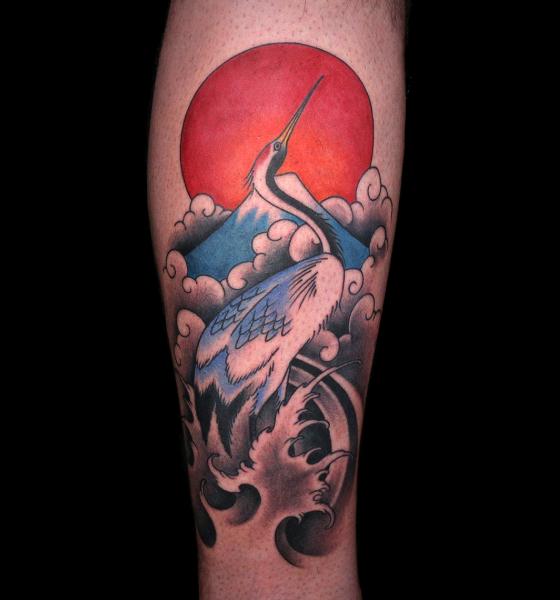
A Look At The Meaning Of Traditional Japanese Crane Tattoos Jorja Drummond Journal Blog
Let's get started! What Is A Crane Japanese Tattoo? A crane tattoo is a traditional Japanese design that features an image of a crane, which is often accompanied by other symbolic motifs such as wave patterns, clouds, and mountains. The crane is seen as a symbol of good luck, longevity, and prosperity in Japanese culture.

40 Japanese Crane Tattoo Designs For Men Bird Ink Ideas
A Japanese crane tattoo on the back, shoulder, or any other region of the body is thought to bring the bearer good luck. This highly special tattoo carries a specific weight of good fortune. Many people throughout the world have a strong devotion to Japanese culture because of its illustrious history and diverse civilizations.

gakkinx Japanese tattoo, Crane tattoo, Tattoos
Japanese Crane Tattoo Meaning Pattern with Japanese Cranes. (Image: Alushka via Depositphotos) The Japanese crane, also called the " red-crowned crane " or "tancho," is a sign of happiness, good luck, and long life in Japan.

Guy With Traditional Japanese Crane Bird Clouds Sleeve Tattoo On Arm Sleeve tattoos, Crane
In the Land of the Rising Sun, the Japanese crane symbolizes peace, luck and longevity. This sacred animal is also associated with loyalty and wisdom. Thus, many beliefs and superstitions emanate from this bird of happiness known as Tsuru: It is said that a crane can live 1000 years or that a couple of cranes presage a happy marriage.

Japanese Crane tattoo by Kat Alden Photo 19608
The meaning of a Japanese crane tattoo is typically extremely crucial. A crane tattoo can signify the health and wellness as well as long life of an individual. In Asia, it can stand for integrity as well as tranquility. It can be a wonderful icon for a tattoo, specifically if it's a sign of integrity as well as tranquility.

40 Japanese Crane Tattoo Designs For Men Bird Ink Ideas
In Japanese culture, the crane represents purity, longevity, and fidelity. In Chinese mythology, the crane is believed to be a symbol of immortality, wealth, and happiness. In various Native American cultures, the crane symbolizes transformation, communication, and healing.

101 Best Japanese Crane Tattoo Ideas You Have to See to Believe! Outsons
Japanese Crane Tattoo Meaning — Red Crowned Tattoo What does the Japanese Crane tattoo mean? The most common meanings for the Japanese Crane (Tsuru) Tattoo are loyalty, fidelity, gracefulness and happiness. For other Japanese tattoo meanings following this link to Red Crowned Irezumi.

40 Traditional Japanese Tattoo Designs With Meaning Worldwide Tattoo & Piercing Blog
Japanese crane tattoos symbolize longevity, good fortune, and the pursuit of dreams. They serve as a reminder to embrace resilience and soar above life's challenges. So, if you're considering getting a tattoo that represents strength, beauty, and the indomitable spirit, a Japanese crane tattoo might just be the perfect choice for you.

40 Japanese Crane Tattoo Designs For Men Bird Ink Ideas Crane tattoo, Tattoo designs men
In the Japanese technique, it represents many things, including strength, passion, and blood. Shrines and temples may be painted in red, and the color is incorporated into significant events and even the national flag. It is also believed to ward off evil spirits and can be symbolic of peace and economic success. Blue

Beautiful Simple Traditional Japanese Crane Tattoo Tattoo japanese style, Crane tattoo, Tattoo now
40 Japanese Crane Tattoo Designs for Men by — Brian Cornwell Published on November 23, 2016 Updated on October 6, 2023 Bird Tattoos Japanese Tattoos The crane is known as the "heavenly crane," the "crane of good fortune," the "bird of happiness," and the "bird of peace."

40 Japanese Crane Tattoo Designs For Men Bird Ink Ideas
The Symbolism of Japanese Crane Tattoos: Understanding the Culture. In Japanese mythology, the crane is believed to be a messenger of the gods and is often depicted as a companion of the Shinto gods. The crane is also associated with happiness, peace, and good fortune. When it comes to tattoo design, the crane can be depicted in a realistic or.

A Look At The Meaning Of Traditional Japanese Crane Tattoos Jorja Drummond Journal Blog
Tattoo Meanings Japanese crane tattoos symbolize longevity, luck, and fidelity. These elegant creatures hold deep cultural significance in japan and have been revered for centuries. Table of Contents The Symbolism Of The Crane In Japanese Culture The Historical Context Of Japanese Crane Tattoos Decoding The Symbolism Of The Japanese Crane Tattoo

A Look At The Meaning Of Traditional Japanese Crane Tattoos Jorja Drummond Journal Blog
Furthermore, the crane's association with longevity adds another layer of meaning to the tattoo. In Japanese culture, the crane is a symbol of good fortune, longevity, and immortality. It is believed that cranes live for a thousand years, making them a powerful representation of longevity and resilience.

40 Japanese Crane Tattoo Designs For Men Bird Ink Ideas
Japanese crane tattoos, also known as "tsuru" tattoos, have deep cultural significance. The crane is considered a sacred creature in japanese folklore, symbolizing luck, longevity, and good fortune.. To sum up, a crane meaning tattoo is a beautiful and symbolic choice for those seeking to express resilience, grace, and longevity through.

Japanese crane by Gustavo Rizerio; Three Kings Tattoo (Brooklyn, NY) tattoos
Japanese Crane Tattoo Meaning: Unlocking the Symbolism Behind In Japanese culture, the crane holds significant symbolism and is a popular subject for tattoos. The crane is revered for its beauty, longevity, and symbolism in various aspects of life. Here are some common meanings associated with a Japanese crane tattoo: Longevity and Good Fortune

Japanese Crane Tattoo Sleeve Small Tattoo Designs
A Japanese crane tattoo is a symbol of good luck and longevity, as well as peace and prosperity. The crane's significance in Japan dates back to the Nara period (710-794), when it was known as the "bird of good omen.". The bird was thought to be able to travel between heaven and earth, making it an ideal messenger between humans and gods.